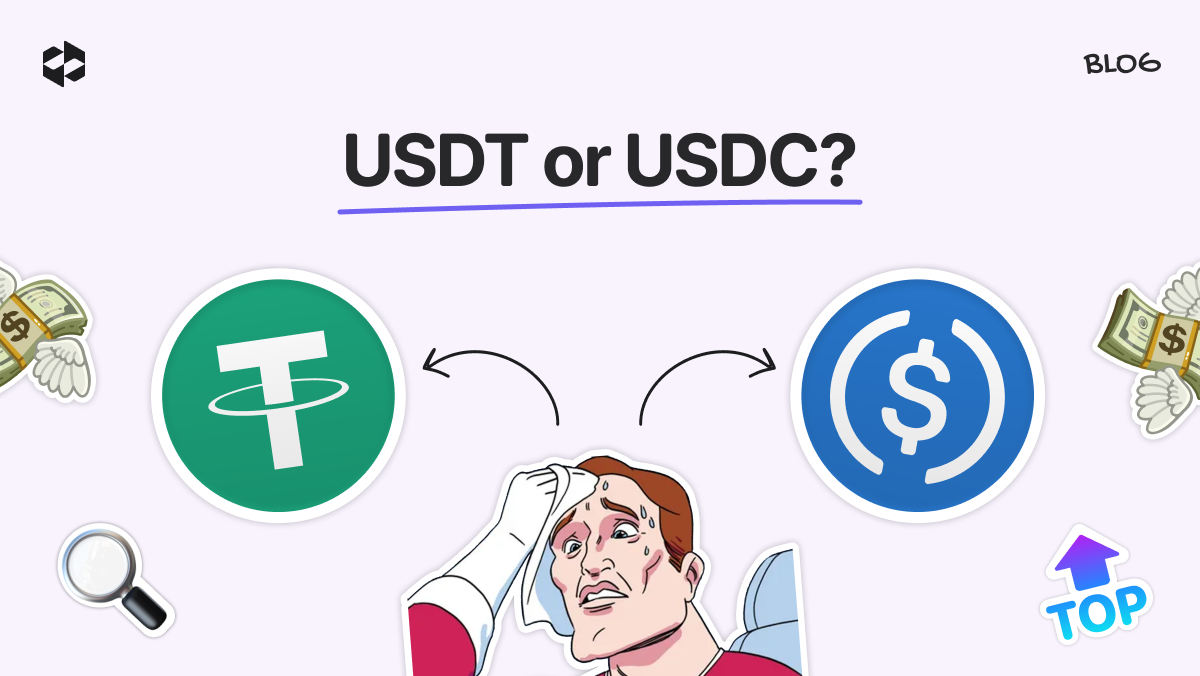
Stablecoins have become essential in the cryptocurrency market, bridging the gap between volatile cryptocurrencies and stable fiat currencies. Among the leading stablecoins, USDT (Tether) and USDC (USD Coin) dominate, each with unique features, problems, and future prospects. Here’s an in-depth comparison of the two.
Understanding USDT and USDC
USDT was launched in 2014 and holds the distinction of being the first widely recognized stablecoin. Issued by Tether Limited, USDT aims to maintain a 1:1 peg to the US dollar. It has established itself as a cornerstone in the crypto ecosystem due to its liquidity and widespread adoption for trading and hedging.
On the other hand, USDC, introduced in 2018 by Circle in collaboration with Coinbase under the Centre consortium, has become known for its strong adherence to regulatory standards and transparent operations. Like USDT, USDC is also pegged to the US dollar and has gained significant traction among institutions and individuals who prioritize security and transparency.
Problems Faced by USDT
USDT has faced consistent challenges, most notably surrounding transparency. Concerns have been raised about the lack of comprehensive, regular audits to verify that its token supply is fully backed by reserves. This has led to market skepticism and periodic doubt about Tether’s backing.
Regulatory scrutiny has also been a significant issue for USDT. Investigations, particularly by the New York Attorney General’s Office, revealed instances where Tether may have misled investors about its reserves. While Tether reached settlements in these cases, the reputational impact lingers, fostering caution among some users.
The composition of USDT’s reserves has been another focal point. It came to light in 2021 that a substantial portion of its reserves was held in commercial paper, a less liquid asset than cash. While Tether has since reduced its commercial paper holdings, questions remain about the quality and stability of its overall asset base.
Problems Faced by USDC
USDC, while generally seen as more transparent, is not without challenges. Due to its origins and operations in the United States, USDC is subject to significant regulatory oversight. This adherence to compliance, while often viewed positively, makes it vulnerable to evolving regulations that could impact its future.
Centralized control is another issue with USDC. The ability of its issuers to blacklist addresses involved in illegal activities, although supportive of legal compliance, may deter users looking for decentralized, censorship-resistant options.
USDC also faces an adoption gap when compared to USDT. Despite its reputation for reliability, USDC has not reached the same level of integration and usage across global exchanges and platforms. This relative lag in adoption can impact liquidity and overall market accessibility.
Prospects for USDT
Despite its controversies, USDT remains the most widely used stablecoin due to its deep liquidity and universal availability on major exchanges and DeFi platforms. This widespread adoption suggests that USDT will continue to be a major player in the crypto space. Efforts by Tether to improve transparency through quarterly attestations and reduced reliance on riskier assets are aimed at strengthening user trust, though their full effect is yet to be seen.
USDT is also diversifying its offerings by exploring stablecoins pegged to other national currencies, such as the euro (EURT). This strategic move could solidify its position as a global leader in stablecoin issuance.
Prospects for USDC
USDC’s strong commitment to regulatory compliance positions it as a stablecoin trusted by institutional investors and entities looking for a secure and transparent asset. Circle’s regular audits and clear communication about reserve holdings foster confidence and could help USDC maintain its growth trajectory, particularly among users prioritizing compliance.
Technologically, USDC has shown promise in enhancing its capabilities, such as incorporating programmable money features. This innovation may expand USDC’s utility within the DeFi sector and beyond, supporting its role in a progressively interconnected financial ecosystem.
Circle's efforts to build partnerships with traditional financial institutions highlight its ambitions to align USDC with mainstream finance. This approach positions USDC as a stablecoin that could integrate seamlessly with potential future developments, such as central bank digital currencies (CBDCs).
Comparison of Market Dynamics
In terms of liquidity, USDT still leads due to its extensive presence across trading platforms and higher trading volume. This makes USDT the preferred choice for many traders who seek minimal slippage and broad accessibility.
However, in the decentralized finance (DeFi) world, USDC has carved out a strong niche thanks to its reputation for transparency and regulatory compliance. Both USDT and USDC maintain a significant presence in DeFi, with each catering to different user preferences and risk tolerances.
Conclusion
USDT and USDC each have their strengths and weaknesses. USDT’s dominant market position is coupled with a history of controversy over its reserves and regulatory challenges. However, its liquidity and adoption ensure that it remains crucial to the crypto market. USDC, on the other hand, boasts regulatory compliance and transparency, making it a favored option among institutions and individuals prioritizing security and trust. Users should weigh the importance of liquidity, transparency, and regulatory risk when choosing between these two giants of the stablecoin world.
